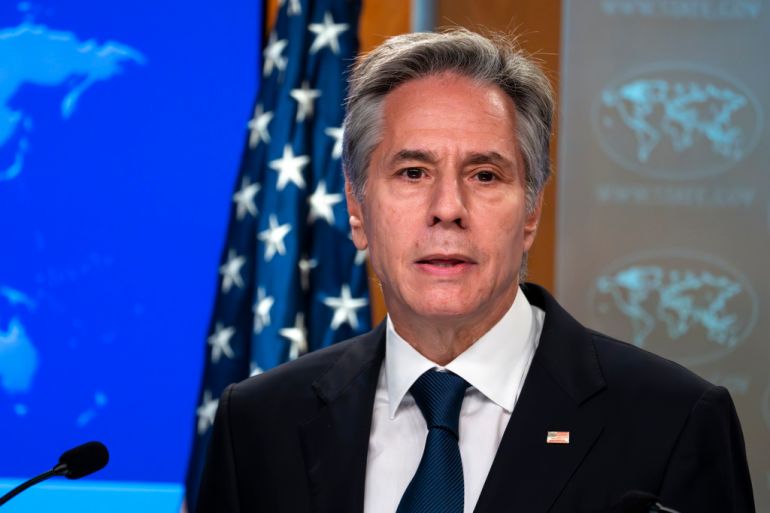US ‘deterrence’ approach to Iran has not changed, Blinken says
Top US diplomat says moving detained Americans to house arrest in Iran is ‘positive’ sign, but major issues remain.

Washington, DC – Secretary of State Antony Blinken has said the United States’s policy of deterrence against Iran has not changed despite signs of a looming prisoner swap between the two countries.
Blinken told reporters on Tuesday that Iran’s decision to move five detained Americans from prison to house arrest last week was a “positive step”, but he added that “they are not home yet”, suggesting that a deal has not been finalised.
Keep reading
list of 3 itemsIran blames ISIL for shrine attack, arrests foreign nationals
US’s Blinken visits Tonga, warns of ‘predatory’ Chinese aid
“We will not rest until our fellow citizens are back in the United States, reunited with their families,” he said.
Several news outlets reported last week that Washington and Tehran were working on a deal to release the American citizens in exchange for freeing several Iranians imprisoned in the US. The tentative agreement would also allow Tehran to access $6bn in frozen funds to use for humanitarian purposes.
On Tuesday, Blinken said any agreement would be solely aimed at freeing US citizens. “Nothing about our overall approach to Iran has changed. We continue to pursue a strategy of deterrence, of pressure and diplomacy,” he said.
He added that the US remains “committed” that Iran would never acquire a nuclear weapon. He also hit out at the Iranian government over human rights abuses and what he called “destabilising actions in the region and funding terrorism”.
“This development — that is the move of our detainees out of prison and to home detention — is not linked to any other aspect of our Iran policy. It is simply about our people,” he said.
The two countries have experienced heightened tensions since 2018, when former US President Donald Trump nixed a multilateral deal that saw Tehran scale back its nuclear programme in exchange for the lifting of sanctions against its economy.
President Joe Biden came into office in early 2021 on a promise to revive the Iran nuclear accord, formally known as the Joint Comprehensive Plan of Action (JCPOA).
But as several rounds of indirect negotiations failed to restore the pact, Washington continued to enforce its sanctions regime against Tehran and piled on more penalties.
Publicly announced JCPOA talks were eventually put on hold, and attempts to restore them were complicated by a crackdown on anti-government protesters in Iran and accusations that Tehran was providing Moscow with drones for use in Ukraine.
Iran, which has denied seeking a nuclear weapon, has escalated its nuclear programme since the JCPOA fell apart.
On Tuesday, Blinken said he could not confirm a recent Wall Street Journal report that Iran has significantly slowed down its uranium enrichment, stressing that there has been no agreement on the nuclear file.
“Of course, we would welcome any steps that Iran takes to actually deescalate the growing nuclear threat that it is posed since the United States got out of the Iran nuclear agreement,” he said.
The US diplomat noted that the Biden administration bolstered its military presence in the Gulf to “account for the Iranians trying to interfere with shipping” in the region’s strategic waters.
Washington has accused Iranian forces of intercepting and seizing several international ships in the Gulf in recent months. The US itself also seized an Iranian oil tanker in April as part of its sanction-enforcement drive.
“There is a long list of things that Iran is engaged in and a long list of actions that we continue to take to oppose what Iran is doing,” Blinken told reporters on Tuesday.